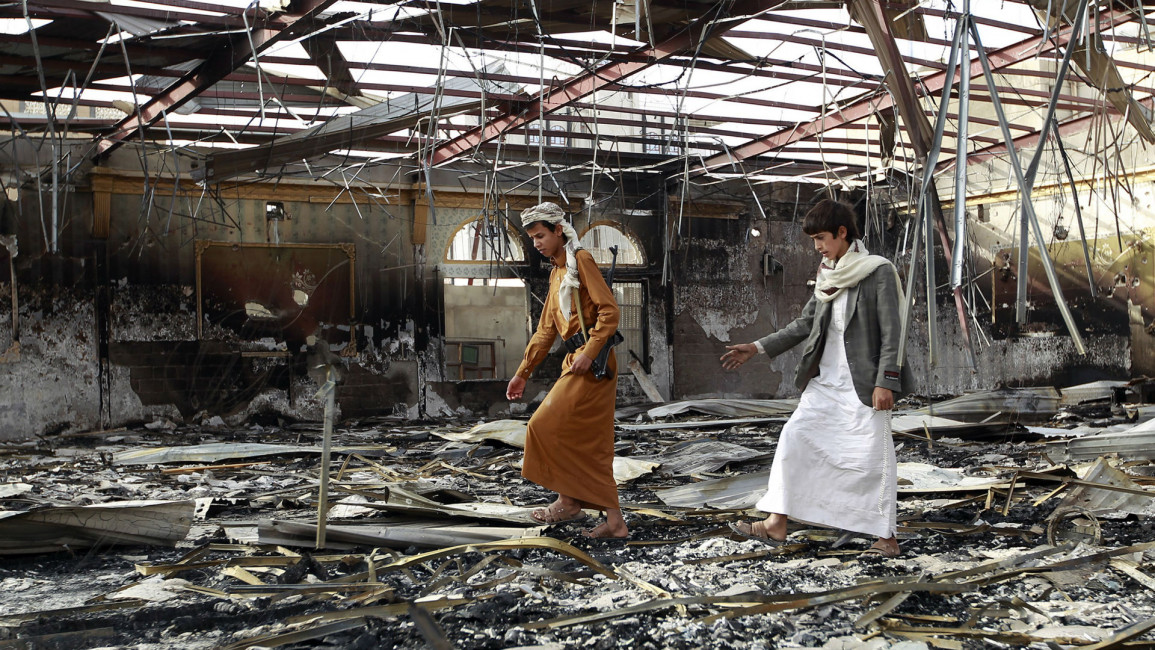'No war without collateral damage', says Saudi-led coalition
The spokesman for the Saudi-led military coalition battling Houthi rebels in Yemen defended the coalition's reckless record in the war-torn country on Monday, stating there cannot be a war without collateral damage.
Turki al-Maliki accused the UN of "biased" reports on air strikes that allegedly killed dozens of children in rebel-held areas, saying there is no war without collateral damage.
"The coalition is surprised by the... biased positions of some reports," said coalition Spokesman Turki al-Maliki, adding that the information was "prejudiced" and based on "rebel stories".
"We all know that UN bodies are under pressure by the Houthi militias ... and these reports may have come in response to that pressure," Maliki said, noting ”there is no war without collateral damage."
Civilian deaths
The coalition has not confirmed or denied it carried out two air raids on Thursday that the UN said killed at least 26 children and four women south of the flashpoint rebel-held city of Hodeida.
The UN Security Council had already called for a "credible" investigation into a strike blamed on the coalition in northern Yemen on 9 August that the Red Cross said killed 40 children.
The coalition has announced its own probe into that raid.
Amid international outrage, two UN officials made public statements condemning the deadly attacks.
Since 2015, Saudi Arabia has been leading a military campaign to restore the internationally-recognised government to power and push back the Houthis, who still hold the capital Sanaa.
The conflict has killed more than 13,000 people since then - the vast majority of them civilians - and caused the world's worst humanitarian crisis, according to the UN.
The coalition has been repeatedly blamed for bombing civilians, including a strike on a wedding hall in the Red Sea coastal town of Mokha in September 2015, in which 131 people died.
A report released on Thursday said the Saudi-led coalition's investigations into alleged war crimes in Yemen lack credibility and have failed to end deadly attacks against civilians in the country.
Human Rights Watch analysed the work of the coalition's investigative body - the Joint Incidents Assessment Team (JIAT) - over the past two years.
War crimes
A 90-page-report by the rights group found that JIAT's work falls short of international standards of transparency, impartiality, and independence, and reaches dubious conclusions demonstrating flawed analysis of the laws of war.
"For more than two years, the coalition has claimed that JIAT was credibly investigating allegedly unlawful airstrikes, but the investigators were doing little more than covering up war crimes," said Sarah Leah Whitson, Middle East director at Human Rights Watch.
"Governments selling arms to Saudi Arabia should recognize that the coalition's sham investigations do not protect them from being complicit in serious violations in Yemen."
The vast majority of JIAT's public conclusions about accusations of war crimes found the coalition acted lawfully, did not carry out the reported attack, or made an "unintentional" mistake, HRW said.
The human rights group has called on coalition member countries to investigate alleged violations and appropriately prosecute people responsible for war crimes, including Saudi and Emirati commanders, whose countries play key roles in coalition military operations.
The UN Security Council should consider sanctions on senior coalition commanders who share responsibility for repeated violations.
"The failure of the coalition's investigative body to carry out credible inquiries and take appropriate action reinforces the urgency for UN Human Rights Council members to renew and strengthen the UN inquiry into violations by all parties in Yemen," Whitson said.


![President Pezeshkian has denounced Israel's attacks on Lebanon [Getty]](/sites/default/files/styles/image_684x385/public/2173482924.jpeg?h=a5f2f23a&itok=q3evVtko)



 Follow the Middle East's top stories in English at The New Arab on Google News
Follow the Middle East's top stories in English at The New Arab on Google News


